By Dave Copeland
Work+Money —
It’s the question we hate most when we’re on a job interview, but it’s also the one that can make or break our application.
What’s your biggest weakness?”
Work + Money spoke with hiring experts, job coaches and people who have come up with a good answer to the question that helped them land a job. They gave us examples of good and bad answers, as well as different strategies for responding to the question.
Hint: Saying you’re a perfectionist or a workaholic or both is the exact opposite of what you should do.

How you answer the question “What’s your biggest weakness?” can make or break your application. (Getty Images)
Here’s what the experts had to say:
Is It Even a Good Question?”
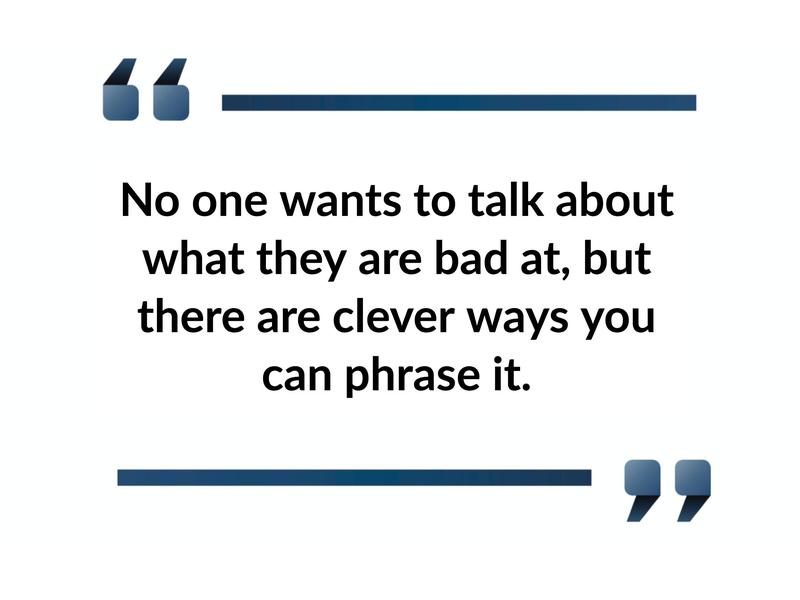
Some HR experts said the weakness question is pointless, since it rarely reveals anything meaningful, but Valerie Streif of Pramp, an online peer-to-peer mock interview platform, warned us that we should expect it and prepare for it.
Whether or not it’s a “good” question is besides the point: if you’re asked it, you can’t tell the interviewer that some HR experts think it’s a useless interview question.
“By spending time during your interview preparation thinking about this question and coming up with an answer, you’ll be able to respond in a way that shows you recognize you aren’t perfect, without stating a weakness that could make you seem like a risky hiring choice,” she said.
“No one wants to talk about what they are bad at, but there are clever ways you can phrase it to make your weaknesses appealing to the interviewer, but without the obnoxious ‘I’m a perfectionist who can’t leave work in the office’ response.”
The Interviewer Is Not Your Therapist
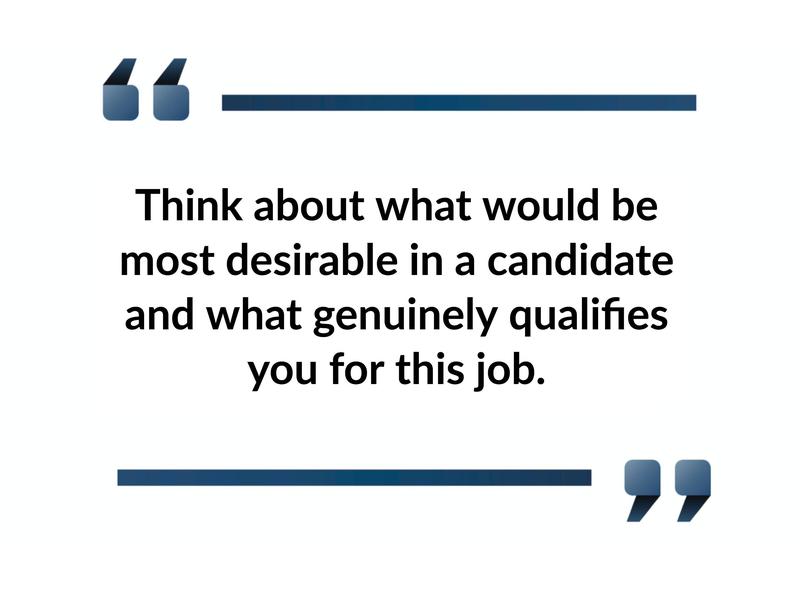
Interviewers are not asking these questions because they want you to overshare, says career coach and author Roy Cohen. They ask them as a way make sure you will act appropriately in a stressful situation.
“So, if you are interviewing to be a sales person in a retail store, think about what would be most desirable in a candidate and what genuinely qualifies you for this job but not necessarily other kinds of jobs,” he advises.
Here is a possible response: “I get bored easily and need to be moving around. Talking to people, listening to them, arranging stuff, and just being busy. If I had to sit behind a desk all day, that would be the worst possible role for me.”
“This is a great response because every retail manager needs employees who will proactively chat with customers, arrange and rearrange the merchandise, and find ways to keep busy,” Cohen said. “But if you are interviewing to be an accountant, or any job that involves sitting in one place for an extended period of time, it would clearly eliminate you as a candidate.”
‘I’m A Perfectionist’ Is The Wrong Answer
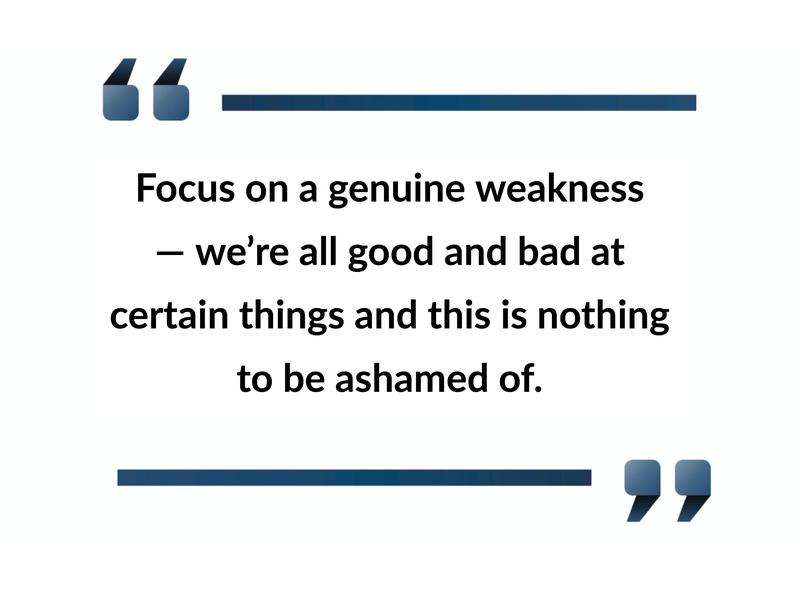
Every hiring manager has heard answers like “I’m a perfectionist” or “I tend to be a workaholic” more times than they care to remember. And a lot of them told Work + Money it’s an awful answer to the “What’s your biggest weakness?” question.
“The problem is, this isn’t really a weakness,” said Craig Dalziel, senior manager at Pearson Frank. “Paying attention to the details and wanting things to be right isn’t normally considered a weakness. Also, this is used so often it’s almost lost all meaning and is bordering on the clichéd.”
He said: “Instead, when answering this question, focus on a genuine weakness — we’re all good and bad at certain things and this is nothing to be ashamed of. Most importantly, emphasize how you are trying to improve that weakness.”
Asking Questions
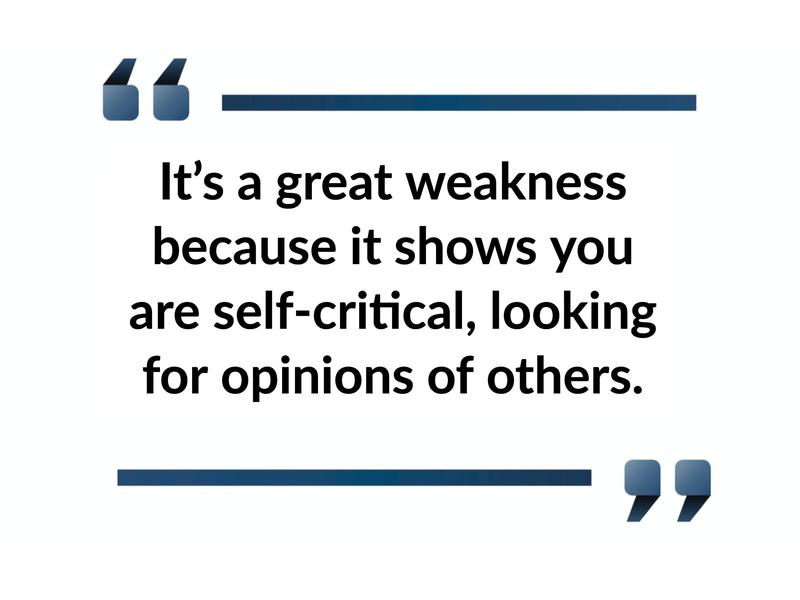
“Sometimes, I ask too many questions rather than trusting my judgement.”
Streif of Pramp thinks this is a good example of a great answer to the biggest weakness question.
“You might occasionally be that annoying co-worker who asks for approval and second opinions too much rather than making decisions and getting things done,” she said. “That’s definitely a weakness, but it’s not one that will cause a hiring manager to revoke an offer.”
She added: “It’s a great weakness because it shows you are self-critical, looking for opinions of others, and that if you were about to make the wrong decision, it would be caught by management before it happened.”
Be Honest but Not Extreme
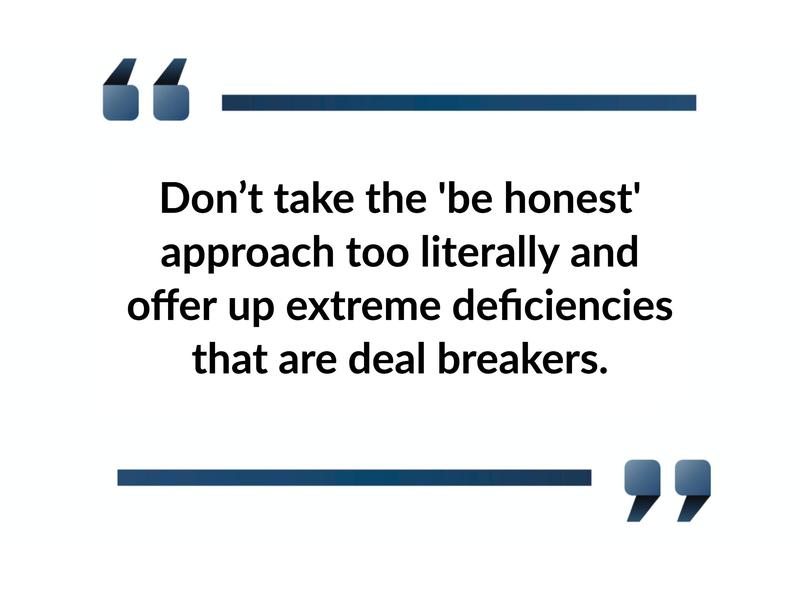
Human resources consultant Laura MacLeod says some candidates take the “be honest” approach too literally and offer up extreme deficiencies that are automatic deal breakers in an interview. She recalled a group interview she sat in on in which a candidate was asked about his biggest weakness.
“I have a problem being in a position of authority. I tend to want to be liked rather than respected,” the candidate told the panel.
“Not the kind of thing you want to share,” MacLeod said.
As for the candidate that offered that answer? “Never saw him again,” she said.
Show You Know The Industry
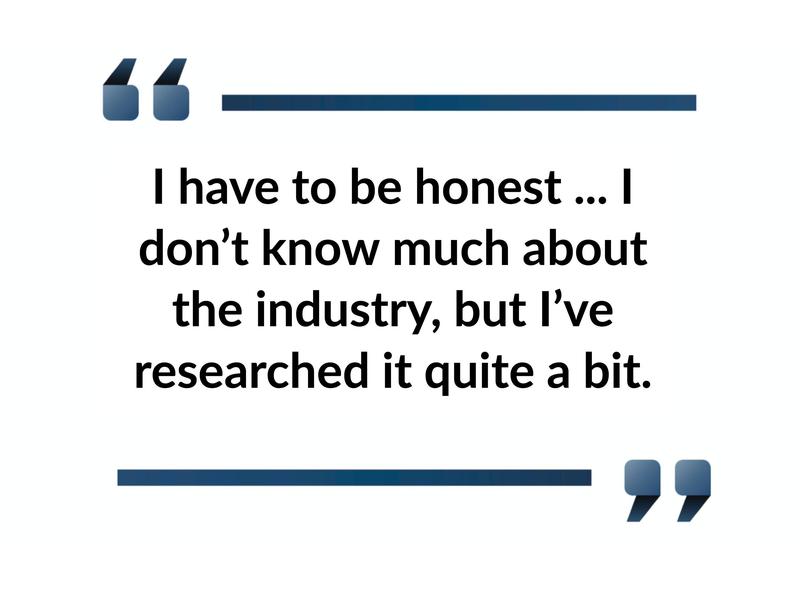
Nick Pennebaker, a digital marketing manager with Northstar Commercial Partners, used to hate getting asked “What’s your biggest weakness?” when he went on job interviews.
Then he realized he could use the question to show he had done his homework and researched the industry he hoped to work in.
This is the answer he came up with when he wanted to jump from finance to commercial real estate:
“I have to be honest — right now I’d have to say my biggest weakness is not really knowing anything about commercial real estate,” Pennebaker told potential employers. “I don’t know much about the industry, but I’ve researched it quite a bit. I know it’s an $8 trillion a year industry, and some of the world’s richest people came from a real estate background.”
Then he would say: “Prior to this, I worked in oil and gas — an area I knew nothing about prior to joining. However after working in the industry for three years, I know more about oil wells than I ever thought possible. I know that after some practice, and talking with the company’s subject-matter experts, that I’ll be able to learn quite a bit at Northstar.”
Be Real
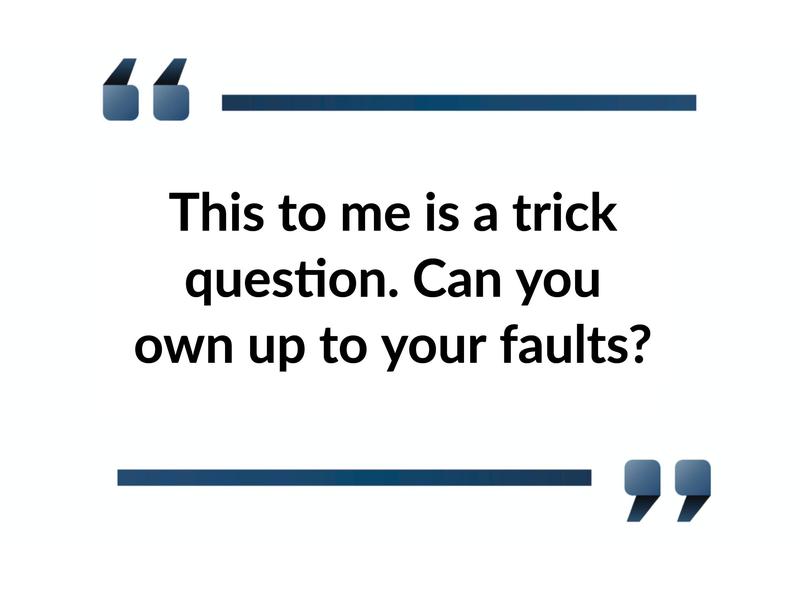
Brianna Rooney is the founder and CEO of Techees.com and has been a recruiter of highly-sought-after software engineers for more than a decade. She cringes when she hears a job candidate say “I’m too organized” or “I pay attention to detail too much.”
“I want to know a real answer. This to me is a trick question. Can you own up to your faults?” she said. “I don’t want to hear you’re lazy or that you hate working. I’d love to hear something like, ‘I’m impatient,’ ‘I’m stubborn,’ or ‘I’m messy.’ You’re a person, you’re not perfect and neither am I.”
Self-Awareness Matters
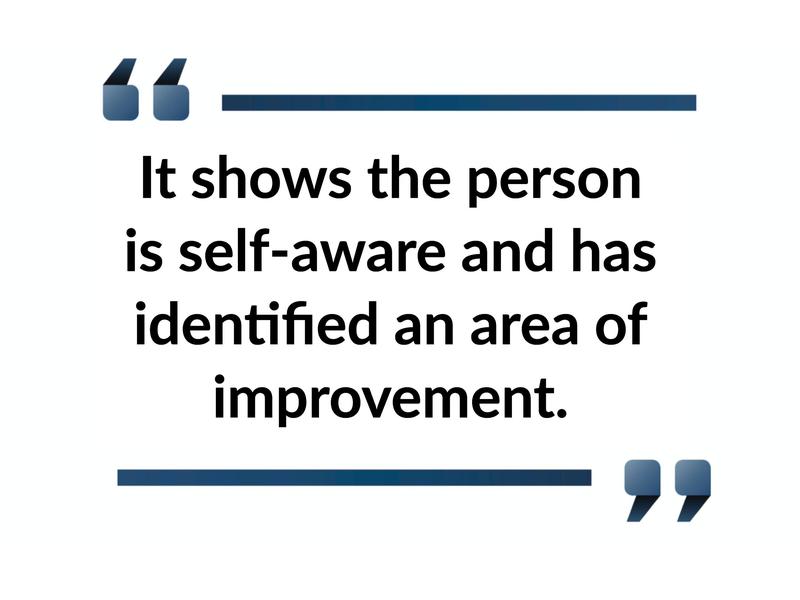
One of the reasons why answering this question is so difficult is most of us aren’t aware of what our biggest weakness is. We might not know what we’re doing wrong.
That’s why Christine Mann advises the applicants she coaches for executive-level positions to do some self-awareness work as part of their job interview prep.
One of those executives did just that and came up with this answer in his successful interview: “In the past, I did some self-awareness work and found out that I am highly extroverted. Sometimes this manifested itself by me thinking and talking out loud when trying to process an idea. I realized that behavior might have been harder on my colleagues who tend to think and process more internally. When I learned this, I actively monitored this and am much more aware and ensure that I give others time to think about an idea before I just blurt out what I am thinking.”
Mann said she loves this answer because it shows that the candidate makes an effort to not only identify his weaknesses, but works hard to improve. “It shows the person is self-aware and has identified an area of improvement and actually did something about it,” she said.
Turn The Questions Back On The Employer
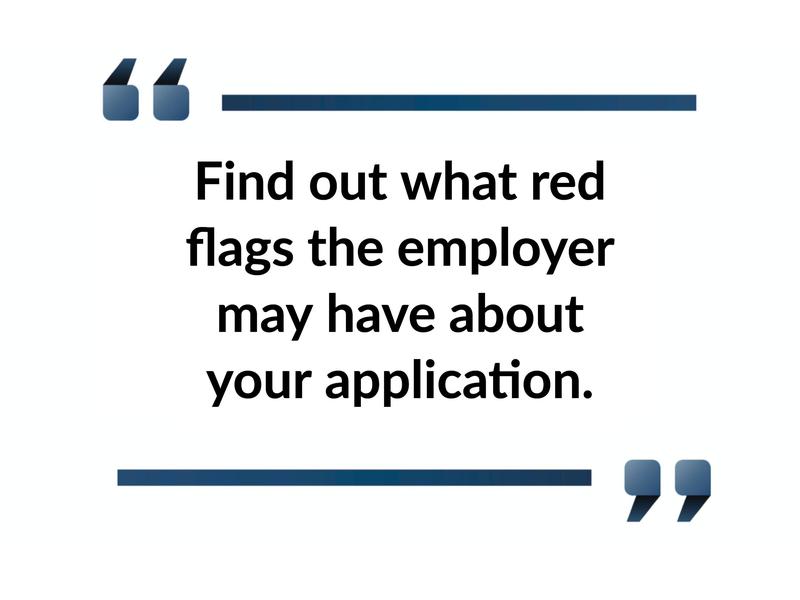
So what happens if you are not asked the “What’s your biggest weakness” question?
According to job coach George Dutch you should ask the interviewer a question that gives you a chance to offer a response to a similar question. These behavioral questions are important in helping an employer avoid hiring a problem employee.
“If these kinds of questions do not arise, candidates should take the initiative to flush out concerns. All managers have them, stated or not. Find out what red flags the employer may have about your application,” Dutch said.
“A good question to ask is ‘Do you have any concerns about my qualifications?’ It is much easier to handle employer concerns while still in the interview than it is for you after you’ve already left.”
This article appeared previously on Work+Money May 7, 2018.











